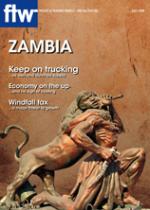THE ESCALATING fuel price is a major concern and
cost to Zambia transport specialist Celtic Freight.
It creates a lot of stress and strain for the
company which has no choice but to pass the cost
on to clients. To make the process as equitable as
possible, Celtic has a base price per ton and every
month they add a fuel surcharge directly related to
the fuel increase.
The benefit is that if the fuel price is reduced the
surcharge is reduced exponentially,
working on similar lines to seafreight
where rates are calculated to
accommodate any changes in
currencies and the like.
Yogesh Kuntawala, managing
director of Celtic Zambia, believes this
is the only way to handle the costs
fairly as they “are not prepared to go
for the kill and hide behind fuel increases to make a
quick profit”.
Celtic is growing along with the Zambian
economy and will be moving to new premises by the
end of 2008 as the company would like to get all its
operations (including bigger offices, warehouses and
open areas) under one roof. This is gigantic progress
from the single 40 foot container which constituted
their original home.
Kuntawala says the major growth has happened
over the past seven to eight years thanks to the new
mines, sugar farming and other developments which
have had a positive impact on all the surrounding
industries and support services.
The Zambian economy is still growing along with
the identification of new mining sites and higher
annual volumes of agricultural produce.
For the company itself the biggest opportunity for
growth is through an increase in its fleet size. They
want to accomplish this without losing sight of the
need to maintain quality service regardless of whether
they have one or 100 trucks. Celtic considers itself
to be part of the service industry and takes pride in
delivering quality along with freight.
In order to do this they are prepared
to look at sustainable development
over the long term instead of
focusing on making a quick profit.
The company’s fleet of 100 crossborder
units specialises in the South
Africa-Zambia route as they would
rather be experts on one route and
thereby offer quality service.
Imports include machinery and equipment for the
mines and other industries, consumable raw materials
for manufacturing, commercial cargo for resale,
irrigation and related material for the agricultural
sector and project cargo. Celtic also has its own lowbed
trucks for the import of abnormal equipment for
the mines and other industries.
Durban is the point of collection for foreign goods
into Zambia. Goods manufactured in South Africa
and imported into Zambia include furniture, irrigation
equipment and the like. A huge part of the freight
consists of paper imports of all kinds, from toilet
paper to cardboard. Approximately 90% of Zambia’s
paper requirements are imported from South Africa.
On the export side freight includes agricultural
products such as cotton which is exported in lint,
seed or cake format, coffee, maize seeds and tobacco.
When it comes to minerals, copper concentrate and
copper cathodes rule the roads.
Celtic also moves a lot of containerised personal
effects out of Zambia.
Fuel surcharge keeps costings fair and equitable
31 Jul 2008 - by Staff reporter
0 Comments
Zambia 2008

31 Jul 2008
31 Jul 2008
31 Jul 2008
31 Jul 2008
31 Jul 2008
31 Jul 2008
